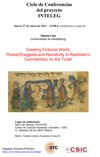Ciclo de Conferencias del Proyecto INTELEG: "Creating Fictional World: 'Peshaṭ'-Exegesis and Narrativity in Rashbam’s Commentary on the Torah"
Por Hanna Liss (Univ. Heidelberg)
Sala Caro Baroja 1D
Abstract: R. Samuel ben Meir (Rashbam, born c. 1085/88) wrote his Torah commentary at a point in time when the French masters of Bible collected their glossae, in particular the ‘Magna Glossatura’ by Petrus Lombardus. But Rashbam wrote his commentary also at the point in time that we today consider to be the turning point in ‘lay literacy,’ when the Anglo-Norman aristocracy patronized the production of romances and historiographic writings. In the first half of the 12th century, Northern France was a vibrant spot. It was an era, in which composing, reading, and listening to narratives and stories intensified as a complex cultural phenomenon. The question of the extent to which the nascent French courtly literature and culture influenced the development of peshaṭ-exegesis has not yet been explored. Scholars have traced the beginnings of the Northern-French exegetical school almost exclusively to the Christian-Latin contextual network. However, Rashbam’s commentary shows that in contrast to his grandfather Rashi his comments expose a biblical episode’s literary and narrative quality rather than its religious meaning. Rashbam aims for achieve a literary and narrative exegesis in such a way that is unthinkable without a possible influence of the contemporary Old French literature.
The lecture shows that the vernacular literature that fascinated French society fascinated the Jews as well, and shows that despite the profound disparity between Chrétien de Troyes’ courtly romances and Rashbam’s Torah-commentary as to literary genres, audience, and respective narrative goals, one finds striking similarities in the way they model and re-model ancient texts and traditions, and how they conducted themselves as ‘young savages.’ The ‘discovery of fictionality’ that we find in Chrétien’s writings, but also in Rashbam’s re-narrations of biblical stories some ten years earlier was an offspring of a new ‘Zeitgeist’ that encompassed the French nobility as well as the Jews.
Organiza: Proyecto INTELEG




